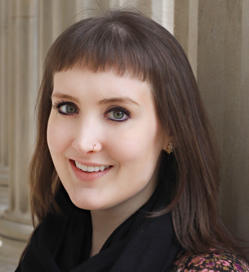
Kelsey Moore
Thesis Title:
Investigation of Glutamatergic Circuitry Underlying Copulatory Reward in Female Syrian Hamsters
Current Position:
Associate Medical Science Liaison, Allergan
Previous Position(s):
Preclinical Study Director, NAMSA Medical Device
Undergraduate Institution and Major:
Hope College, B.S. in Biology with minors in Neuroscience and Psychology, 2012
Graduate Advisor:
Robert Meisel, Ph.D., Department of Neuroscience
Graduate Publications:
- Moore KM, Oelberg WL, Glass MR, Johnson MD, Been LE, Meisel RL. Glutamate afferents from the medial prefrontal cortex mediate nucleus accumbens activation by female sexual behavior. Front Behav Neurosci. 2019 Oct 4;13:227.
- Gross KS, Moore KM, Meisel RL, Mermelstein PG. mGluR5 mediates dihydrotestosterone-induced nucleus accumbens structural plasticity, but not conditioned reward. Front Neurosci. 2018 Nov 20;12:855.
- Moore KM, Himmler BT, Teplitzky BA, Johnson MD, Meisel RL. Measuring in vivo changes in extracellular neurotransmitters during naturally rewarding behaviors in female syrian hamsters. J Vis Exp. 2017; Sep 12;(127). doi: 10.3791/56135.
- Been LE, Moore KM, Kennedy BC, Meisel RL. Metabotropic glutamate receptor and fragile X signaling in a female model of escalated aggression. Biol. Psychiatry 2016;79:685-692.
Graduate Abstracts:
- Moore K, Meisel R. Investigation of glutamate neurotransmission in copulatory reward of sex behavior in female Syrian hamsters. Abstract poster presentation, Society for Neuroscience annual meeting, San Diego, CA, 2016.
- Moore K, Been L, Meisel R. Investigation of glutamate neurotransmission during sex behavior in female Syrian hamsters. Abstract poster presentation, Society for Neuroscience annual meeting, Chicago, IL, 2015.
- Moore K, Been L, Meisel R. Neurotransmitter measurement during sexual behavior in female Syrian hamsters. Abstract poster presentation, Society for Neuroscience annual meeting, Washington D.C., 2014.
- Moore K, Been L, Meisel R. Aggressive experience increases PSD-95 in the nucleus accumbens of female hamsters via the fragile X mental retardation protein signaling pathway. Abstract poster presentation, International Congress of Neuroendocrinology/Society for Behavioral Neuroendocrinology conference, Sydney, Australia, 2014.
- Moore K, Been L, Meisel R. Increased accumbal glutamate release during sex behavior in female hamsters. Abstract poster presentation, Organization for the Study of Sex Differences annual meeting, Minneapolis, MN, 2014.
Professional Presentations:
- Investigation of glutamatergic circuitry underlying copulatory reward of sexual behavior in female Syrian hamsters. Oral presentation at Department of Neuroscience Colloquium Series, University of Minnesota, Minneapolis, MN, May 31, 2017.
- Glutamate neurotransmission in sexual reward and motivation. Oral presentation at Department of Neuroscience Colloquium Series, University of Minnesota, Minneapolis, MN, May 25, 2016.
- Investigation of glutamate neurotransmission during sex behavior in female Syrian hamsters. Oral presentation at Department of Neuroscience Colloquium Series, University of Minnesota, Minneapolis, MN, March 4 2015.
Thesis Committee Members:
- Paul Mermelstein, Ph.D., Department of Neuroscience (Chair)
- Alfonso Araque, Ph.D., Department of Neuroscience
- William Engeland, Ph.D., Department of Neuroscience
- Matthew Johnson, Ph.D., Department of Biomedical Engineering
- Robert Meisel, Ph.D., Department of Neuroscience
Description of Graduate Research:
The nucleus accumbens and medial prefrontal cortex are brain regions known for their integral role in the processing of reward and motivated behaviors. My dissertation work utilizes sexual behavior in female hamsters to examine the underlying circuitry and mechanisms of naturally-rewarding behavior. Previous work in our lab has demonstrated increased dopamine release in the NAc during sexual behavior, and that this dopaminergic neurotransmission is necessary for sexual reward to occur. Recently, I have shown that a similar pattern of glutamate release takes place in the NAc during sexual behavior. I am currently examining the underlying circuity and functional consequences of this sex-induced glutamatergic neurotransmission.
Research Categories:
- Drug Abuse and Addiction
- Behavioral and Cognitive Neuroscience
Graduate Level Awards and Honors:
- Stark Award for Advanced Scholarship, August 2014
- American Neuroendocrine Society Travel Award, August 2014
- Doctoral Dissertation Fellowship Award, University of Minnesota, September 2016-May 2017.
Rotations:
- Catherine Kotz, Ph.D., Department of Integrative Biology and Physiology, Department of Food Science and Nutrition
- Paul Mermelstein, Ph.D., Department of Neuroscience
- Robert Meisel, Ph.D., Department of Neuroscience
GPN Committees:
- Member, Graduate Program in Neuroscience Faculty Status Committee, January 2013-May 2015
- Student Board, Fourth-Year Representative, May 2015-present
Other Committee Involvement:
- Advanced Professional Degree Consulting Club, Member, Fall 2015-present.
Professional Outreach:
- Volunteer, Annual Brain Bee competition at University of Minnesota Fall 2012
- Volunteer, Brain Awareness booth at the Minnesota State Fair, Summer 2013 and 2014
- Volunteer, Brain Awareness demonstration at the Science Museum of Minnesota, Fall 2014, 2015, and Spring 2016.
Internships:
- Content Development in Physician Relations, Office of Medical Affairs, Peripheral at Medtronic, May 2017-present.
- Economic Development Consulting Intern at Kerry, January 2017-May 2017.
- Sector Landscapes Intern at Medical Alley Association, March 2016-December 2016.
Professional Memberships:
- Organization for the Study of Sex Differences
- Society for Behavioral Neuroendocrinology
- Society for Neuroscience
Why Did You Choose MN?
I chose University of Minnesota over several other graduate programs in neuroscience because of our excellent environment for fostering independent scientists. Not only is our curriculum exemplary in setting up a broad foundation of knowledge, but we have an excellent funding history with several institutional training grants within our department alone. The breadth of different neuroscience research happening at the university also provides students to study practically any neuroscience topic.
What Advice Would Give a First Year Graduate?
The most important decision you will make in your graduate career is the lab you choose. Make sure that your educational goals overlap with the expectations of your advisor, and that you feel you can openly communicate with your advisor both regarding your science and your personal goals. Science is hard enough without unnecessary miscommunication and relational stress.
